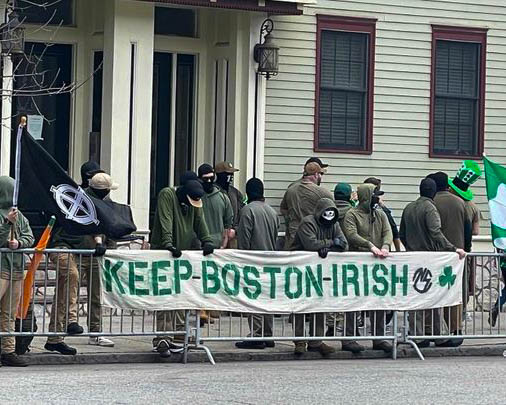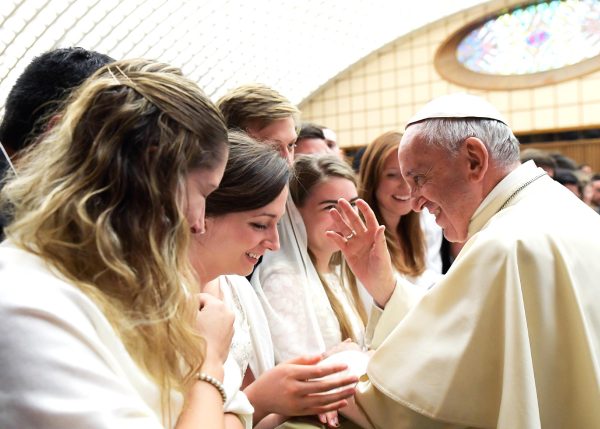Boston Still Has a White Supremacy Problem

White supremacists gather on West Broadway at the South Boston Saint Patrick’s Day Parade. (Source: Boston.com)
During this year’s South Boston Saint Patrick’s Day parade, people displaying neo-Nazi symbols were seen holding up a “Keep Boston Irish” sign, one of many instances of white supremacy tainting Boston’s progressive reputation.
South Boston’s annual parade, though known for its lively festivities, has a history of publicly displaying propaganda and excluding certain minority communities, such as the LGBTQ+ community.
Even during cultural celebrations in Boston, hate toward minority groups still manages to be seen, contradicting the city’s popular self-image as an all-inclusive and progressive community.
This year’s parade was not the first sighting of neo-Nazi supporters in the Boston area. Earlier this year in February, another group of people also wearing neo-Nazi symbols was spotted outside of Brigham and Women’s Hospital holding a sign that reads “B&W Hospital Kills Whites.” They were calling out two doctors by name, who were working on establishing healthcare equity for communities of color in Boston.
People have seen explicit white supremacy and white-nationalist supporters multiple times this year. It is disturbing how confident these hate groups are to show up at public centers in Boston. If Boston were truly as all-inclusive as it claims to be, hate groups and supporters would not manifest themselves so unashamedly in public.
Oriana Dunker (IV) remarks, “Boston is seen as progressive because we have more diversity; there are more people of color who live in Boston compared to some other [cities]. More diversity, however, doesn’t always mean less racism.”
Dunker brings up a strong point as to what progressive really means. Being surrounded by various predominantly white suburbs, such as Brookline and Milton, has strengthened Boston’s reputation as a flourishing progressive and diverse city, in contrast to neighboring towns’ relative homogeneity. Too often, however, are “progressive” and “diverse” used synonymously.
Acts of explicit racism are often overlooked in Boston, as white supremacy is ingrained in the city’s oldest institutions. The Boston education industries can be hotspots for bias and discrimination against people of color because of how white supremacy played a big part in the formation of these places.
Up to this day, Boston neighborhoods remain segregated, leading to further segregation in schools. Black and Latinx youth continue to receive weak education in schools that lack the basic materials and necessities needed for good instruction.
As Ita Berg (IV) puts it, “White supremacy is part of Boston’s history, so it inevitably is part of Boston’s present. For example, I think you can see white supremacy in Boston’s policing: neighborhoods with high populations of color, especially mainly Black neighborhoods, are policed much more heavily than mainly white neighborhoods, and if one neighborhood is policed more heavily than another, of course, more crime is found and more arrests are made in the heavier-policed neighborhood.”
While Boston’s flourishing Irish and Italian communities make up a central and historic part of Boston’s cultural diversity, intentionally refraining from referring to white people as “white” when discussing white supremacy and racism, and instead making an effort to use ethnic names, can derail the conversation from people of color. The “Keep Boston Irish” sign is a perfect example of this phenomenon; although it sounds less threatening, it clearly amounts to “Keep Boston White.”
BLS English teacher Ms. Marie Helen Carr adds, “As Boston expanded and grew more diverse, [their] original culture didn’t dissipate and we can see folks still [identifying] more with the ethnic backgrounds of their ancestors rather than […] as white people.”
In order to live up to Boston’s progressive reputation, one must be able to acknowledge how white supremacy dictates every decision as wide-reaching as legislation and as personal as a community celebration. As the BLS T.H.R.I.V.E core values state, we must lead forth into a brighter future.







MrBlackett • May 4, 2022 at 5:49 pm
Well Said!